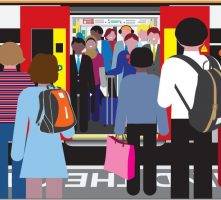September 5, 2016
Majority of Londoners support greater restrictions on new tall buildings 0
 Most Londoners think tall buildings should only be built in areas like the City and Canary Wharf, and that there should be limits on how high they can be, according to an IPSOS Mori survey carried out on behalf of the Skyline Campaign. The findings come after Westminster Council controversially gave the green light for a 30 storey tower to be built in Paddington, and show stark differences in the views of Londoners in the inner and outer boroughs about how this new generation of tall buildings is affecting the Capital. The survey of more than 500 Londoners finds almost half (49 percent) of residents of inner London boroughs think that the 270 tall buildings planned, proposed, or under construction in London is too many. This contrasts with 34 percent of people in outer boroughs who say the same. Latest data released after the research was conducted indicates more than 400 new tall buildings are planned, proposed or under construction.
Most Londoners think tall buildings should only be built in areas like the City and Canary Wharf, and that there should be limits on how high they can be, according to an IPSOS Mori survey carried out on behalf of the Skyline Campaign. The findings come after Westminster Council controversially gave the green light for a 30 storey tower to be built in Paddington, and show stark differences in the views of Londoners in the inner and outer boroughs about how this new generation of tall buildings is affecting the Capital. The survey of more than 500 Londoners finds almost half (49 percent) of residents of inner London boroughs think that the 270 tall buildings planned, proposed, or under construction in London is too many. This contrasts with 34 percent of people in outer boroughs who say the same. Latest data released after the research was conducted indicates more than 400 new tall buildings are planned, proposed or under construction.



































